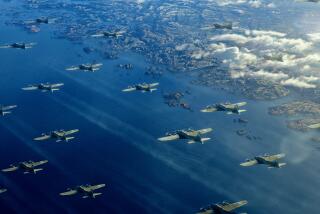Tuskegee Airmen Carry Inspirational Message
- Share via
While most pilots dream of breaking the sound barrier, the Tuskegee Airmen broke through what many would consider an even tougher obstruction: the race barrier.
How to succeed when the system is set up to defeat you is the message four members of the first all-black squadron of combat fighter pilots and crew tried to convey to nearly 300 fifth- and eighth-graders at Castaic Middle School on Thursday.
“The thing I really want you to do is believe in yourself,” said Louis Young, 76, a captain and navigator trained during World War II at a segregated facility in Tuskegee, Ala. “You have to think that you will always achieve, no matter what.”
Achieve is what the Tuskegee Airmen did. During World War II, about 450 Tuskegee Airmen fought over North Africa, Sicily and Europe. They destroyed 260 enemy planes, damaged 148 others and sank a German destroyer. No U.S. bomber was shot down while flying under the protection of the fighter group.
But often the Tuskegee Airmen fought their toughest battles against the military establishment. The Pentagon did not allow black men to serve as fliers until 1943, and only then because the Allies were suffering huge losses against Nazi Germany.
Joining Young in telling their stories were Sgt. Edward L. Brantley, 73, a crew chief; Warrant Officer Theodore R. Davidson, 72, and 2nd Lt. Roger Terry, a pilot.
Terry spoke of how he was court-martialed for defying orders and going into a “white” officers club after being told that no “Negroes” were allowed.
“We decided we wouldn’t go to Uncle Tom’s cabin,” he said. “So we went to the white officers club and group by group we got arrested.”
But it was often the opposition the airmen faced that made them want to learn more and succeed. “When I got into the service I was [urged] not to pursue my interest in flying,” Brantley told the group. “I was told I was not needed. I was not wanted.
“All along your life you’re going to run into obstacles,” Brantley continued. “Be prepared to go around them and continue to your goal in another way.”
It was a message that many of the Castaic Middle School students, who gave the airmen a standing ovation, took to heart.
“They’re great,” David Angeles, 14, said of the airmen. “They show us the importance of perseverance.”
More to Read
Sign up for The Wild
We’ll help you find the best places to hike, bike and run, as well as the perfect silent spots for meditation and yoga.
You may occasionally receive promotional content from the Los Angeles Times.






